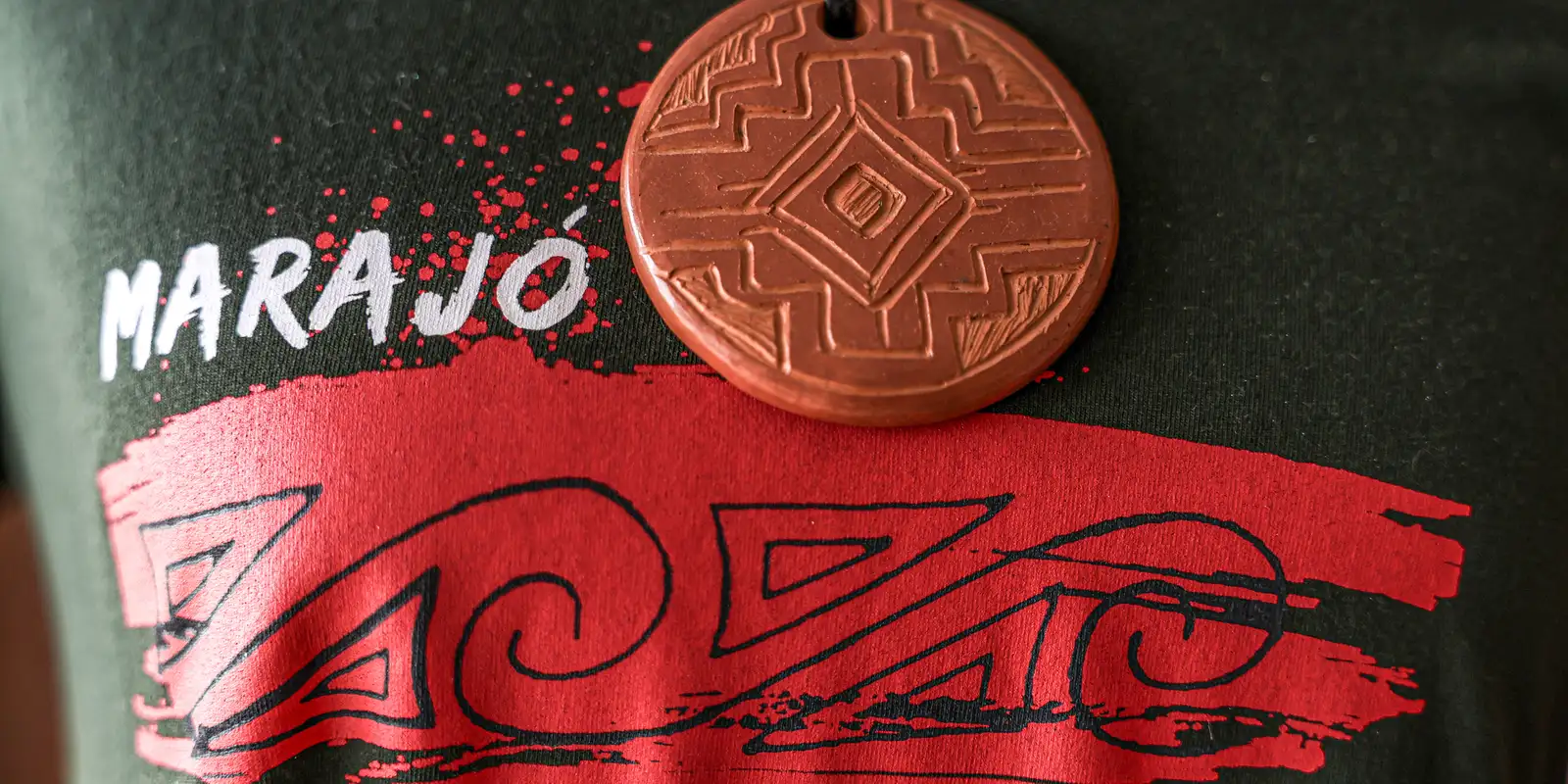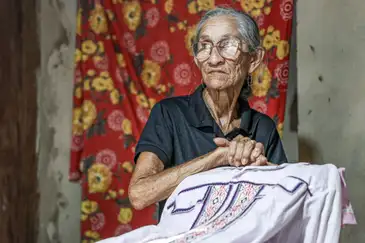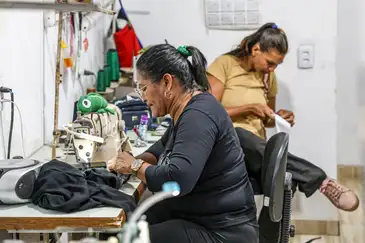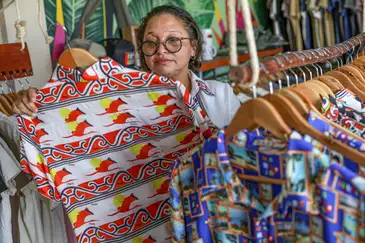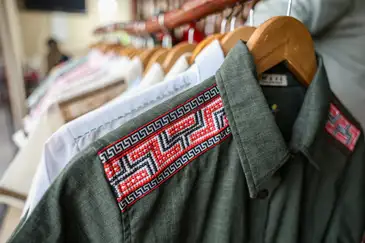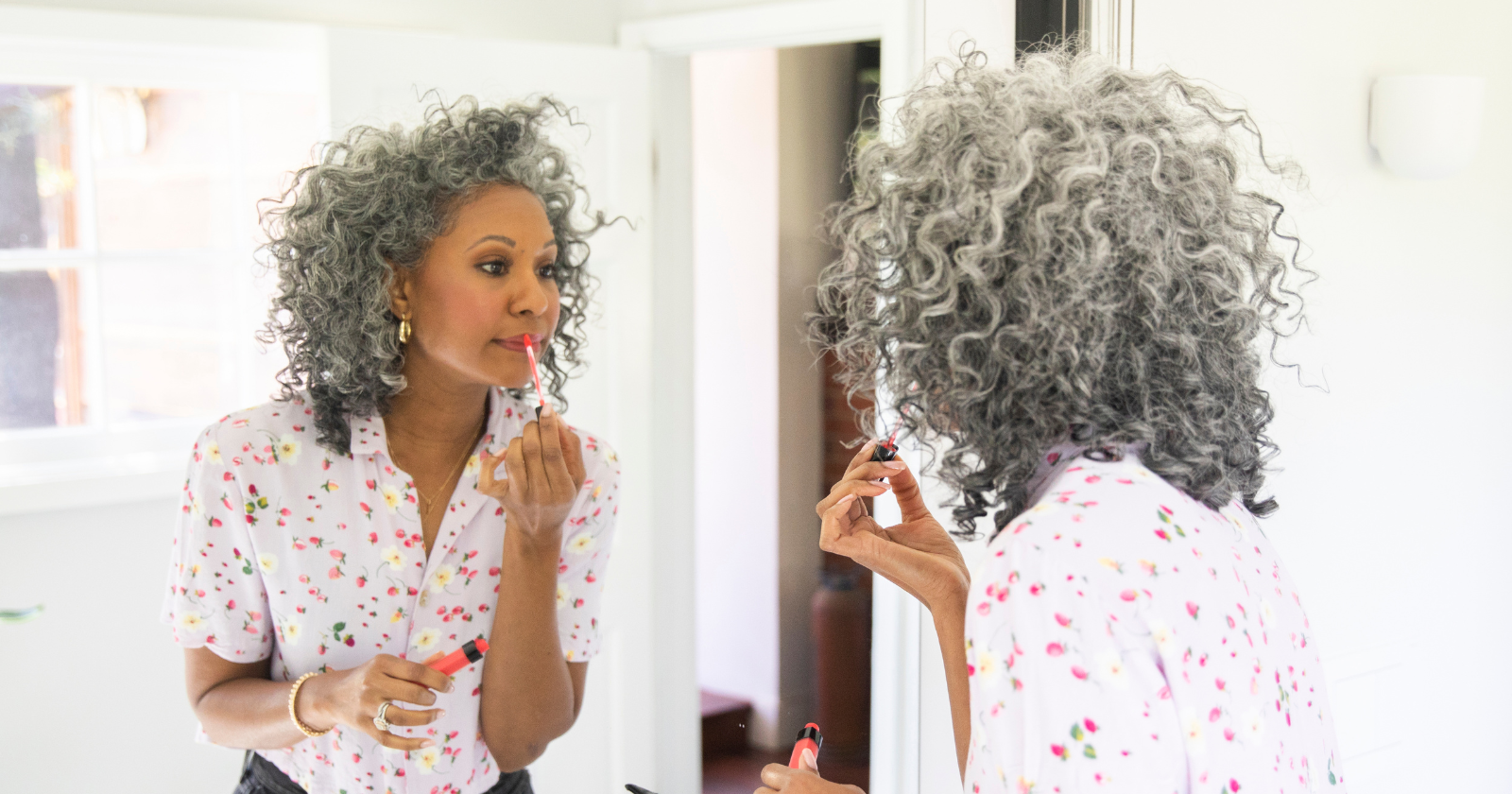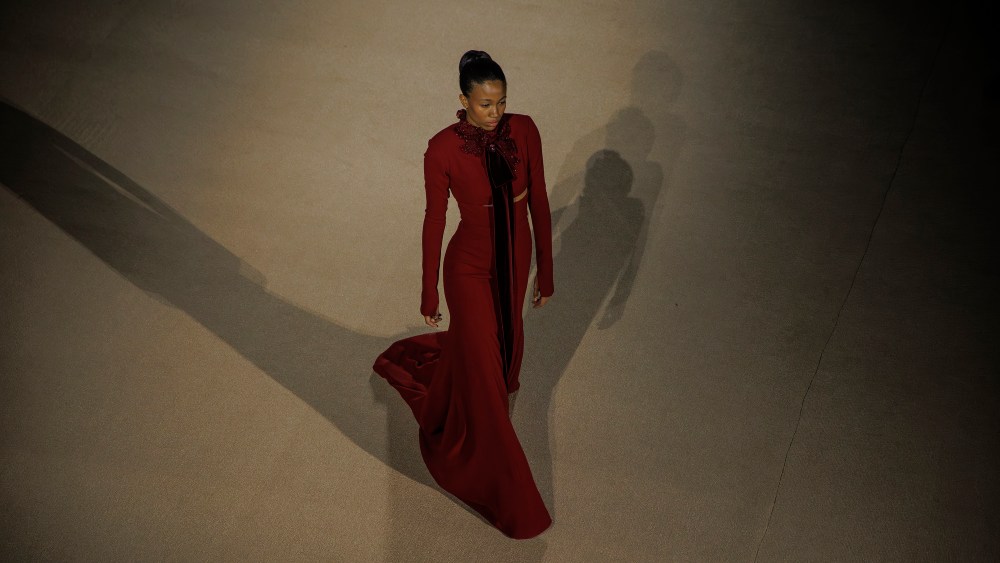Dona Cruz, 77, lives and works in a small house with plastered walls. Her simple life in Soure, a municipality on Marajó Island, Pará, contrasts with the type of clothing she makes every day: a Marajó-style formal dress featuring patterns typical of the ancient culture developed there.
The piece, usually a button-down shirt, is designed for special occasions. Depending on the complexity, it can take one to three days to produce. Made of cotton fabric, it has ribbons embroidered with thread and displays patterns inspired by ancient indigenous ceramics.
Frequent customers include politicians and farmers. After state governor Helder Barbalho wore a suit made by Dona Cruz at the 2023 Amazon Summit, demand for her garments increased.
The seamstress works on commission and ships her products to various locations across the country. However, this strong demand has not yet translated into a significant improvement in Dona Cruz’s living conditions, as the financial gains remain modest.
“Usually, what I earn from selling the shirts goes toward buying new materials. So when a customer arrives, I always have something available. I work independently, without taking out loans, and my retirement money goes toward household expenses,” explains the seamstress.
“The price of each garment depends on the size and whether it has short or long sleeves, so it can range between BRL 290 and BRL 410,” she explains. The clear benefit has been the opportunity to stay active and gain new knowledge.
“I worked as a school inspector and then retired. After I became a widow, to avoid being idle, I dedicated myself to making shirts. It’s good to keep your mind occupied and not think about other things, right?” says the seamstress.
Among the few gifts Dona Cruz received was an industrial sewing machine, provided through a partnership between the city of Soure – the island’s capital – and the state government.
In addition, she received a set of guidelines from the Brazilian Micro and Small Business Support Service (Sebrae) as part of the Marajó Fashion Hub program. She learned about pricing and sales strategies, improving product presentation – such as using appropriate packaging – and accessing new markets.
“The Marajó Fashion Hub has transformed the lives of its participants by generating income opportunities, reviving traditional knowledge, and boosting the self-esteem of the women involved. By professionalizing production, fostering entrepreneurship, and connecting these artisans and seamstresses to new markets, the Hub promotes productive inclusion, economic autonomy, and cultural appreciation,” says Renata Rodrigues, Sebrae manager in Marajó.
At the end of October, Dona Cruz will share her knowledge with others on the island. She will teach a Marajó shirt-making course through Sebrae, helping to preserve an embroidery technique that few master. Her teacher, known as Baiano, died of COVID-19 during the pandemic. Of his ten students, only Dona Cruz completed the course.
Tradition and livelihood
From ancestral ceramics to contemporary catwalks, Marajó art takes on new forms in the hands of 56-year-old quilombola Rosilda Angelim, an artisan and seamstress from Salvaterra, a municipality on Marajó Island.
Before making a living from art, she worked as a teacher and civil servant. After losing her job, she faced financial hardship and depression, until discovering a new opportunity in sewing.
“It was like a push. I started sewing about 30 years ago, but 16 years ago I truly found myself in Marajó designs,” says the artisan.
“My goal is to promote my culture. I want the world to know about Marajó Island,” says Angelim.
Today, she runs a studio with six people, producing clothes and accessories that blend fashion with Amazonian identity. Her creations are sold in stores in Belém – the city that will host COP30 – and attract buyers from other regions of the country.
Sustainability is also central to the work. The studio uses 100 percent cotton fabrics and repurposes leftover materials.
“Nothing goes to waste. We donate leftovers to women who make rugs and other crafts. It’s good for the environment and helps families,” explains Angelim.
With the 30th United Nations Climate Change Conference (COP30) in Belém approaching, production is expected to rise.
“We have to believe that COP will bring good things – not just for the climate, but for culture in general: our cuisine, crafts, and organic jewelry. We’re embracing this and preparing a larger volume of pieces for the season. My goal is to make money, of course – I don’t want to be hypocritical – but I also want to share my culture with everyone,” says the artisan.
Signature brand
French teacher turned seamstress and entrepreneur: this is the story of Glauciane Pinheiro, 40, who enrolled in the industrial sewing course “without ever having touched a machine.” The project was aimed at people with experience, but some spots were open to beginners – and that’s how she developed her new skill.
“I was unemployed and going through a difficult emotional time. I joined the course mainly to distract myself, but I ended up discovering my passion for sewing,” explains Pinheiro.
From then on, her interest in printing and creating collections grew. With the support of her husband, who gave her two machines, she set up a small studio in her bedroom and launched the Mang Marajó brand.
The entrepreneur began producing clothing with original prints and embroidery, some created by families and outsourced groups in the region. Today, she views local tourism as a concrete opportunity for growth.
“Since preparations for COP30 began, the city has changed. There’s more activity, more tourists. I receive visitors every day, even at night or on Sundays,” says Pinheiro.
“We believe that tourism can sustain Marajó, and I want to make a living from it – through culture and art,” she adds.
The shared hope of those making a living from fashion in Marajó is that November will be a turning point for the sector in Pará, bringing greater visibility and increased public investment.
“The main challenges remain limited access to modern equipment, ongoing technical training, marketing channels, and financing. To improve the situation of these women, it is necessary to strengthen institutional partnerships, expand access to both digital and physical markets, invest in entrepreneurial training, and ensure public policies that support local development with identity,” explains Sebrae director Renata Rodrigues.
*The Agência Brasil reporting team traveled at Sebrae’s invitation.
